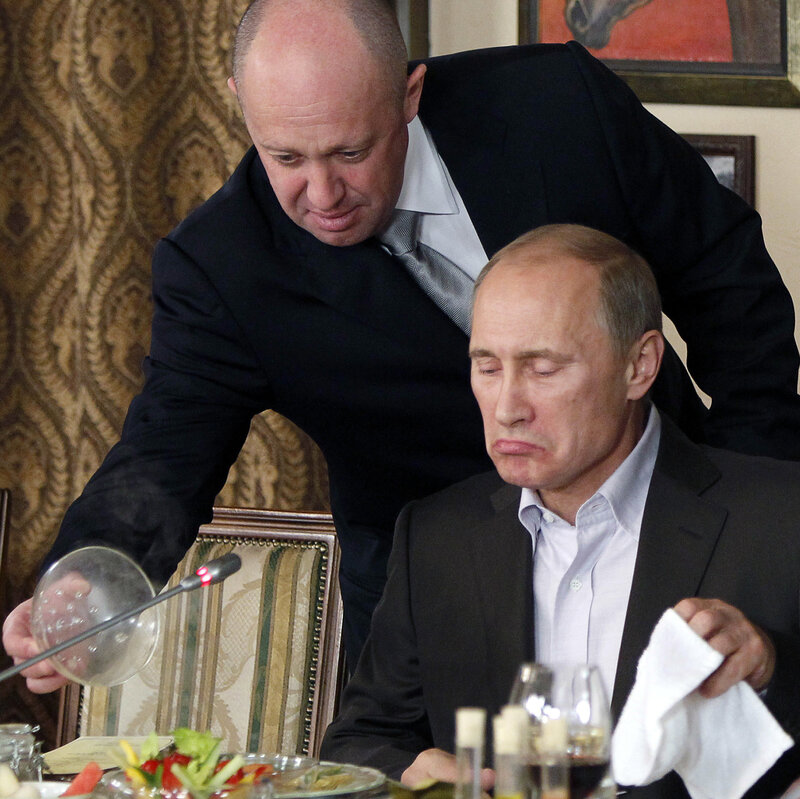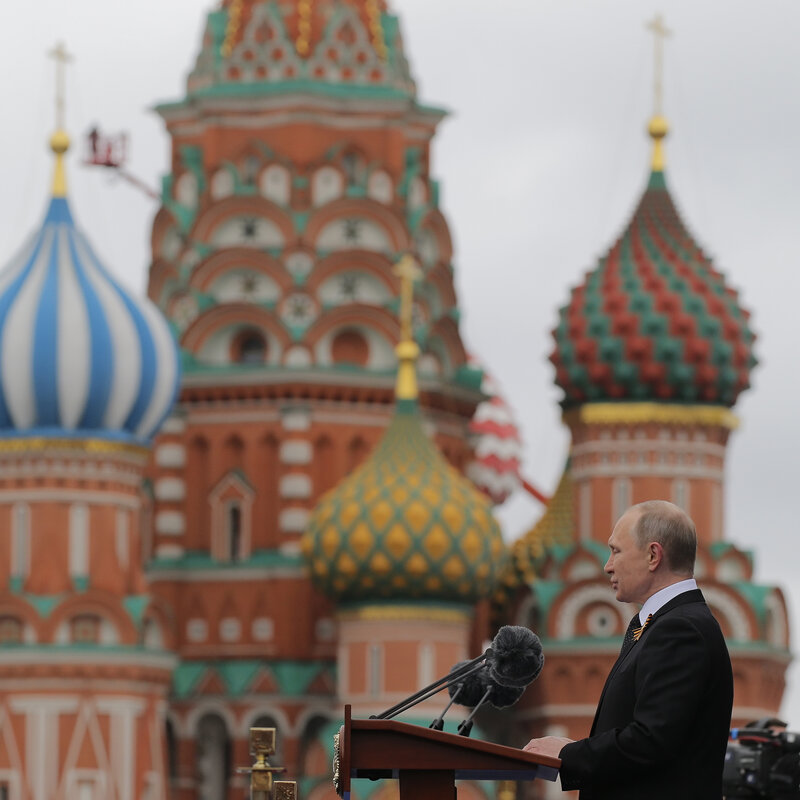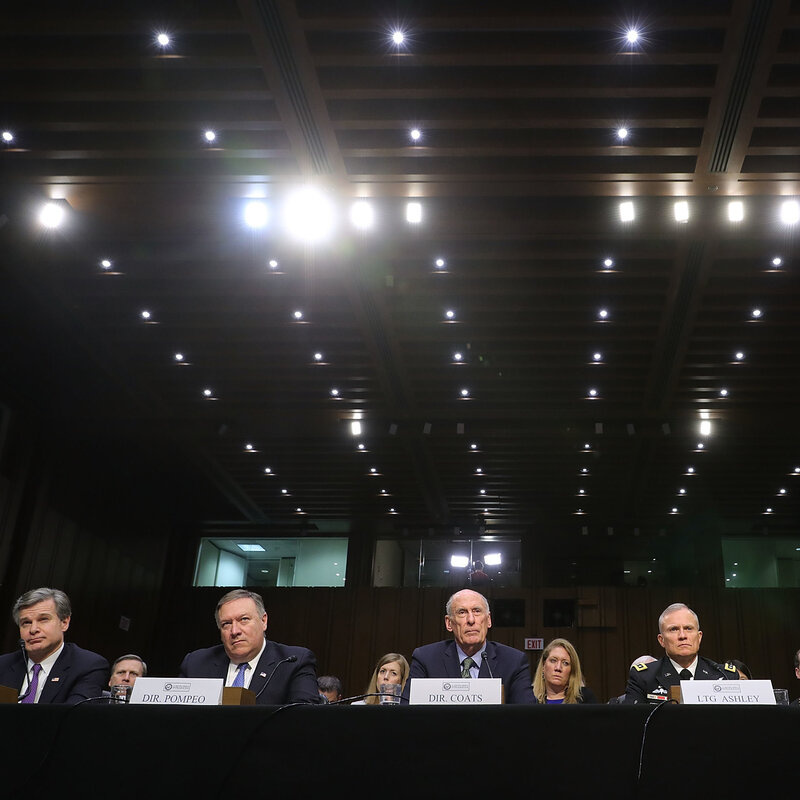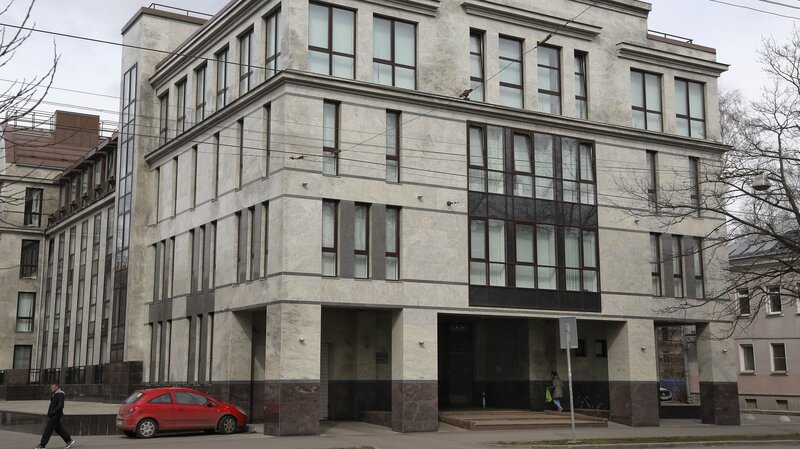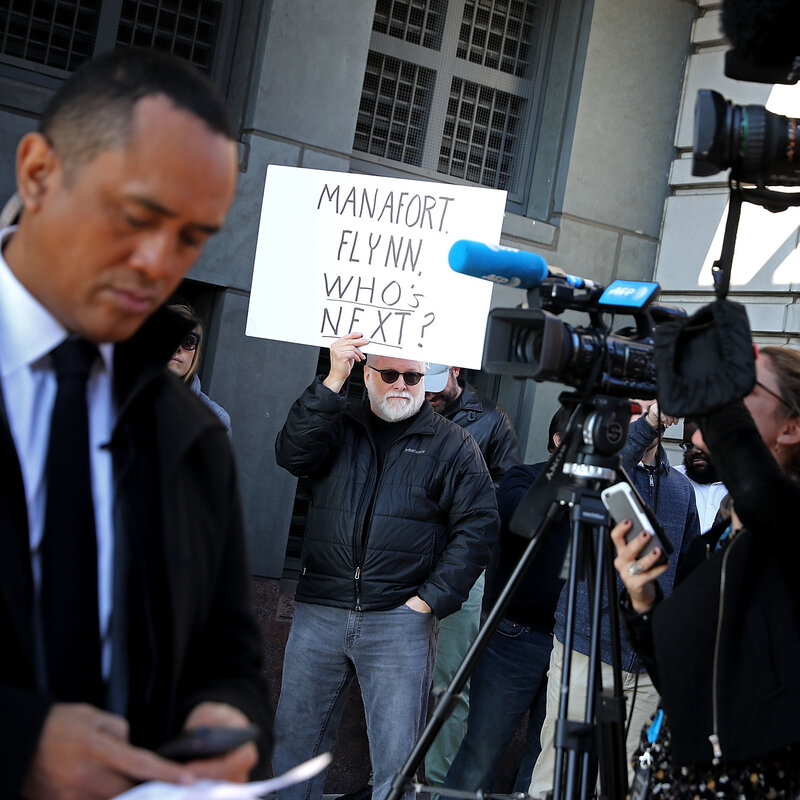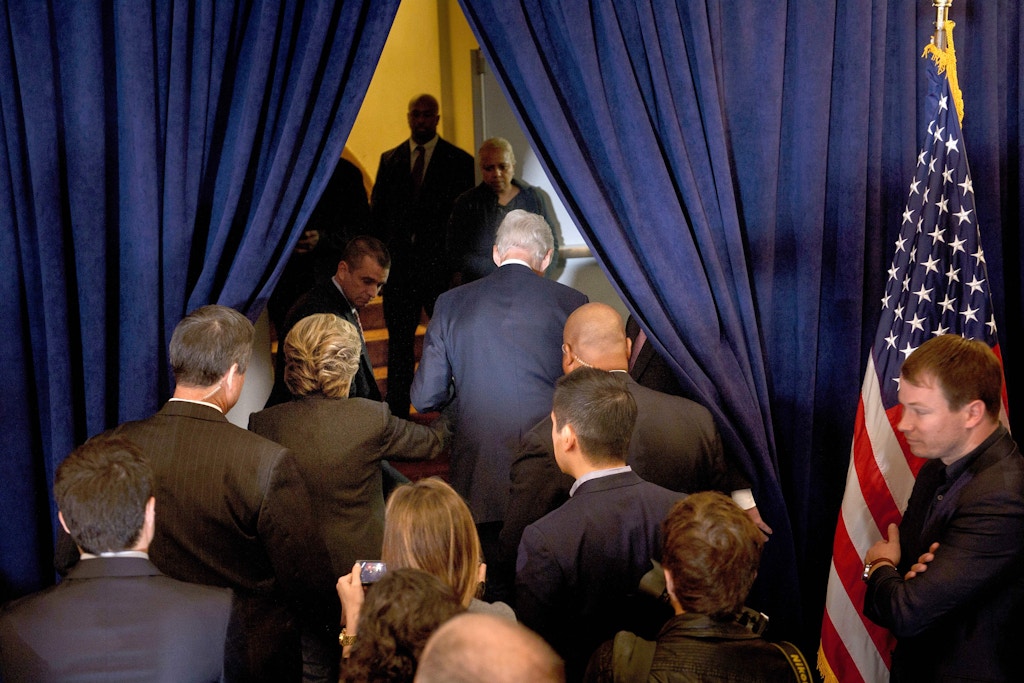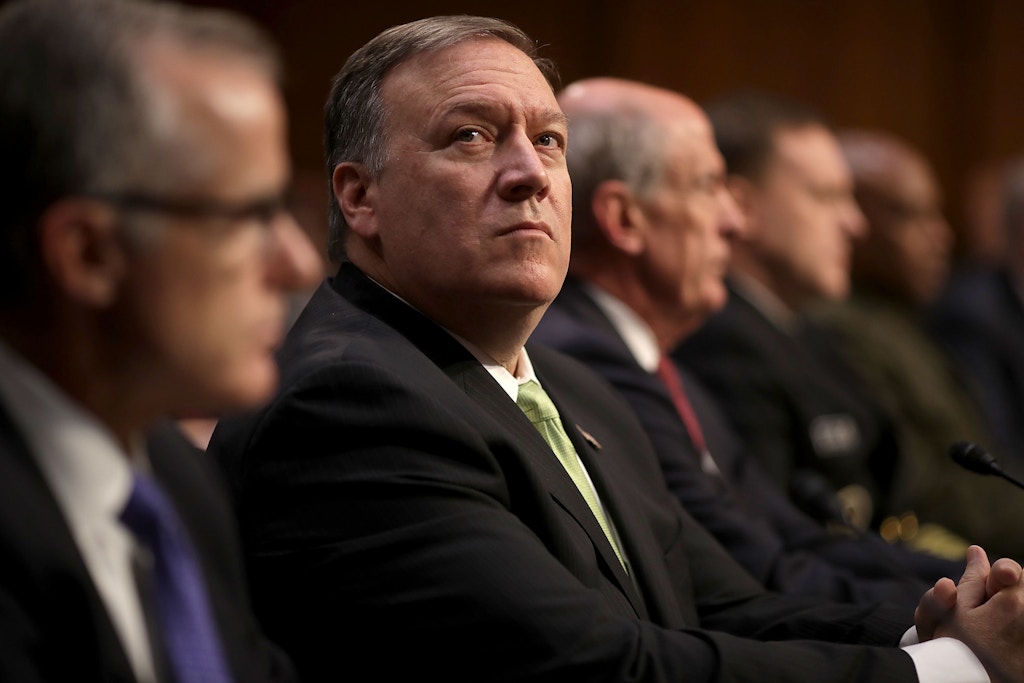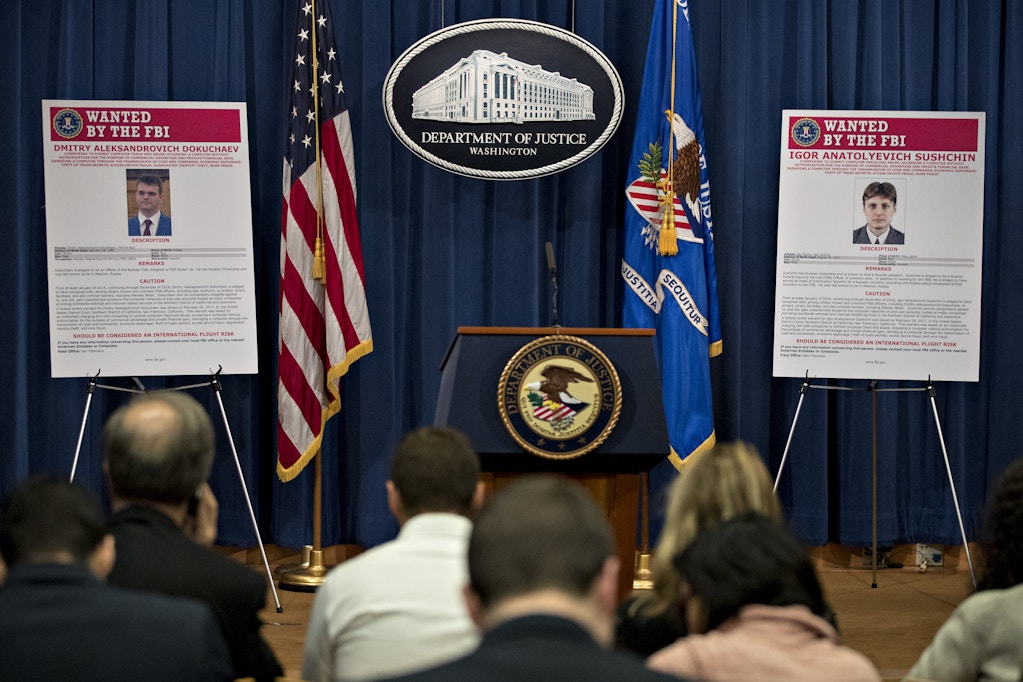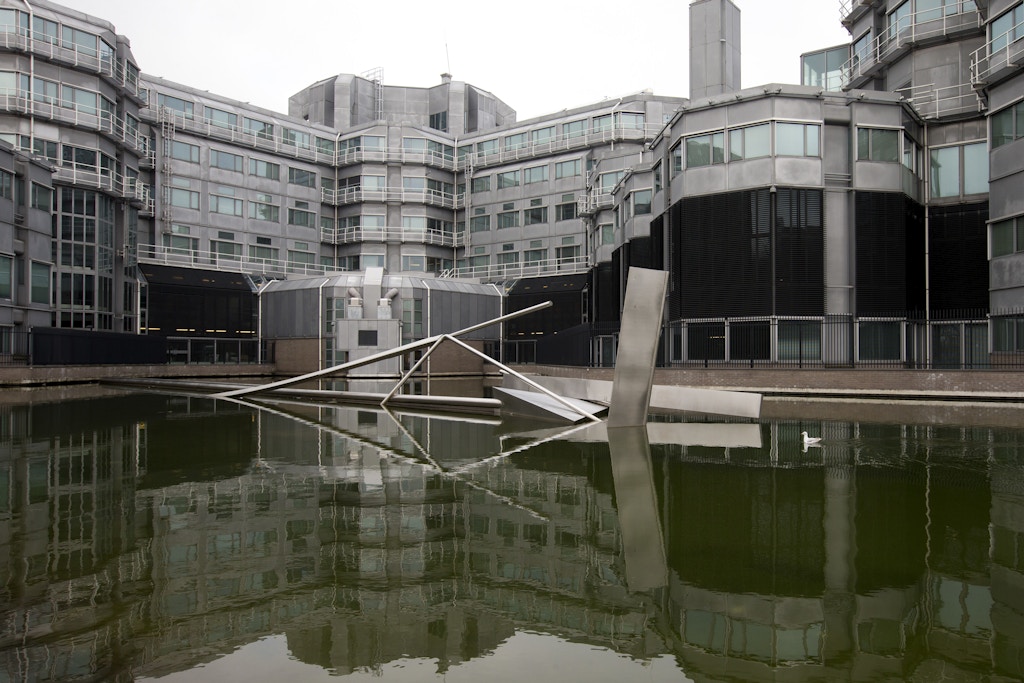Robert Mueller's First Charges
The special counsel overseeing the Russia investigation reportedly obtained a sealed indictment on Friday.
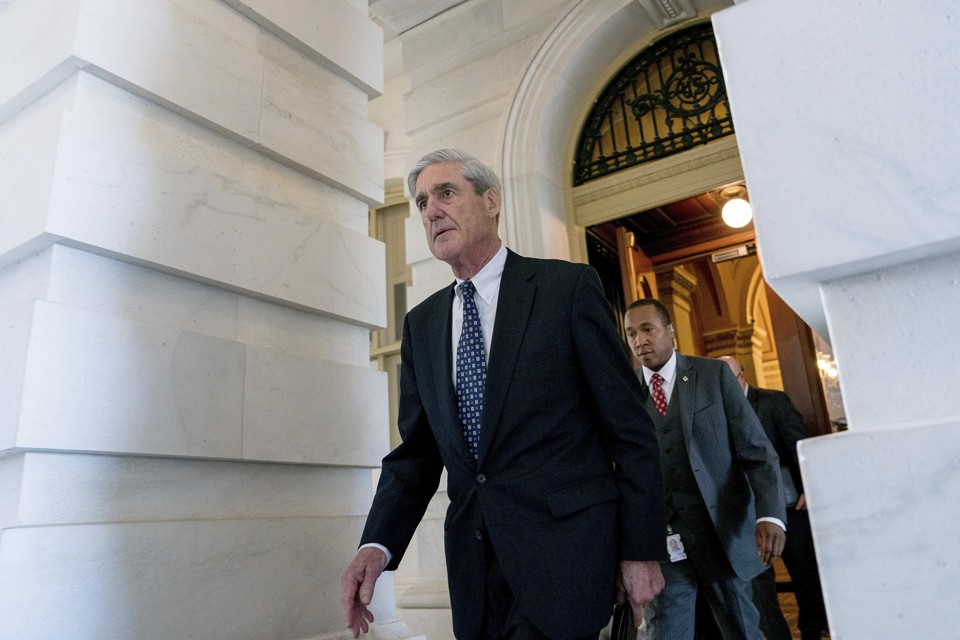
Andrew Harnik / AP
Citing “sources briefed on the matter,” the network said a federal grand jury in Washington, D.C., approved the charges, which have been sealed by a federal judge. CNN did not indicate who had been charged, how many people had been charged, or what charges had been filed by Mueller’s team. An arrest could come by Monday. Reuters subsequently confirmed CNN’s reporting.
John Q. Barrett, a St. John’s University law professor and former associate special counsel in the Iran-Contra affair, said that a sealed indictment itself is rare, as is its disclosure to the press. “It's possible that this could come from sources in the Department of Justice or defense counsel, each of which would have been likely to know that charges were going to be sought and that a sealing order was going to be sought,” he explained.
“It’s unusual and would be a serious violation,” Matthew Miller, a former Justice Department spokesman under the Obama administration, said Friday night. “No one outside of the Justice Department or the court—including grand jurors, court reporters and such—should know, with the possible exception of the defendant’s attorney, who might have been briefed to arrange surrender.”
No matter who is indicted, the move will send shockwaves throughout the Trump administration and the nation’s capital. Until now, the Russia investigation has followed President Trump’s first year in office like a shadow, darkening his political fortunes without substantially altering them. A federal indictment of anyone connected to the Trump campaign or the White House would turn that theoretical danger into hard reality.
The news comes after a week of intensifying conservative criticism of Mueller’s probe. Trump-aligned media figures latched onto a CNN report that Clinton campaign officials had funded the creation of the Steele dossier, an intelligence document on Trump’s Russian ties privately drafted by a British ex-spy in 2016, to try to discredit the overall Russia investigation. (The FBI’s inquiry predates the dossier, and officials have reportedly said it played no role in the intelligence assessment of Russia’s interference in the 2016 election.) Trump himself joined the chorus, claiming on Twitter that former presidential candidate Hillary Clinton should be the real focus of scrutiny.

Donald J. Trump
@realDonaldTrump
It is now commonly agreed, after many months of COSTLY looking, that there was NO collusion between Russia and Trump. Was collusion with HC!
8:33 AM · Oct 27, 2017
The indictment marks a major step forward for the Russia investigation itself. Deputy Attorney General Rod Rosenstein appointed Mueller as special counsel to oversee the Justice Department’s investigation on May 17. The selection capped a two-week political firestorm for the White House after President Trump abruptly fired former FBI Director James Comey on May 9. Trump initially cited the director’s controversial actions in the Hillary Clinton email investigation the previous year to justify the dismissal.In the days that followed, however, Trump undermined that narrative on multiple occasions. He told NBC News’ Lester Holt that Comey’s firing was related to the Russia investigation, and that he would’ve fired Comey regardless of the Justice Department’s recommendations. He also warned the former director on Twitter that Comey should hope there were no tapes of their White House conversations. In response, Comey asked an intermediary to provide reporters with a series of contemporaneous memos the director had drafted after meetings with Trump earlier in the year.
The memos collectively depicted a president who had little regard for the traditional firewall between the White House’s political operations and the Justice Department’s criminal investigations. In one instance, Comey wrote that Trump asked him to drop the investigation into Michael Flynn shortly after Flynn’s departure as national-security adviser. Trump had fired Flynn, a close but controversial political ally, in February for lying to Vice President Mike Pence and other White House officials about his conversations with Russian Ambassador Sergey Kislyak.
One day after the New York Times reported on the memo, Rosenstein named Mueller to head the sprawling federal probe into Russian meddling in the 2016 election. The selection of Mueller, a former FBI director himself with a reputation for integrity and strong bipartisan credentials, to lead the investigation received applause on Capitol Hill. Trump was less enthusiastic. The president publicly called the investigation a “witch hunt” and reportedly excoriated Attorney General Jeff Sessions for recusing himself in March.
At the heart of Mueller’s investigation is the extent and nature of Russian interference. U.S. intelligence agencies concluded in December that the Kremlin deployed cyberattacks and stolen documents in an effort to damage Hillary Clinton’s presidential bid and bolster Trump’s chances. Comey told Congress in March that part of the investigation’s purview included allegations that the Trump campaign had colluded with Russian government officials to undermine Clinton’s campaign. Trump has strongly denied he collaborated with Moscow during the election.
The Investigation into Paul Manafort
After taking command of the investigation, Mueller absorbed a series of parallel federal inquiries, including on into Flynn’s lobbying payments from Turkey and another into former Trump campaign chairman Paul Manafort’s business dealings in Ukraine. Mueller is also reportedly investigating whether Trump committed obstruction of justice by firing Comey, as well as the nature of Donald Trump Jr.’s July 2016 meeting with Russian nationals who claimed to have damaging information about Clinton.
With so many lines of inquiry, it’s impossible to know who could be facing federal authorities on Monday. In September, the Times reported that prosecutors on Mueller’s team told Manafort in August that he would be indicted during an early-morning raid at his Virginia home. Manafort, for his part, has repeatedly denied any wrongdoing before or during the election.
In addition to all those topics, Rosenstein also authorized Mueller to pursue “any matters that arose or may arise directly from the investigation.” That would include the discovery of crimes unrelated to Russia, such as tax-related offenses that may be unearthed during a financial probe. Interfering in the investigation by lying to federal investigators or committing perjury before the grand jury would also fall under the terms of Rosenstein’s original letter.
https://www.theatlantic.com/politics/archive/2017/10/robert-mueller-sealed-indictment/544292/
.
The special counsel overseeing the Russia investigation reportedly obtained a sealed indictment on Friday.

Andrew Harnik / AP
- MATT FORD AND ADAM SERWER
- OCT 27, 2017
Citing “sources briefed on the matter,” the network said a federal grand jury in Washington, D.C., approved the charges, which have been sealed by a federal judge. CNN did not indicate who had been charged, how many people had been charged, or what charges had been filed by Mueller’s team. An arrest could come by Monday. Reuters subsequently confirmed CNN’s reporting.
John Q. Barrett, a St. John’s University law professor and former associate special counsel in the Iran-Contra affair, said that a sealed indictment itself is rare, as is its disclosure to the press. “It's possible that this could come from sources in the Department of Justice or defense counsel, each of which would have been likely to know that charges were going to be sought and that a sealing order was going to be sought,” he explained.
“It’s unusual and would be a serious violation,” Matthew Miller, a former Justice Department spokesman under the Obama administration, said Friday night. “No one outside of the Justice Department or the court—including grand jurors, court reporters and such—should know, with the possible exception of the defendant’s attorney, who might have been briefed to arrange surrender.”
No matter who is indicted, the move will send shockwaves throughout the Trump administration and the nation’s capital. Until now, the Russia investigation has followed President Trump’s first year in office like a shadow, darkening his political fortunes without substantially altering them. A federal indictment of anyone connected to the Trump campaign or the White House would turn that theoretical danger into hard reality.
The news comes after a week of intensifying conservative criticism of Mueller’s probe. Trump-aligned media figures latched onto a CNN report that Clinton campaign officials had funded the creation of the Steele dossier, an intelligence document on Trump’s Russian ties privately drafted by a British ex-spy in 2016, to try to discredit the overall Russia investigation. (The FBI’s inquiry predates the dossier, and officials have reportedly said it played no role in the intelligence assessment of Russia’s interference in the 2016 election.) Trump himself joined the chorus, claiming on Twitter that former presidential candidate Hillary Clinton should be the real focus of scrutiny.

Donald J. Trump
@realDonaldTrump
It is now commonly agreed, after many months of COSTLY looking, that there was NO collusion between Russia and Trump. Was collusion with HC!
8:33 AM · Oct 27, 2017
The memos collectively depicted a president who had little regard for the traditional firewall between the White House’s political operations and the Justice Department’s criminal investigations. In one instance, Comey wrote that Trump asked him to drop the investigation into Michael Flynn shortly after Flynn’s departure as national-security adviser. Trump had fired Flynn, a close but controversial political ally, in February for lying to Vice President Mike Pence and other White House officials about his conversations with Russian Ambassador Sergey Kislyak.
One day after the New York Times reported on the memo, Rosenstein named Mueller to head the sprawling federal probe into Russian meddling in the 2016 election. The selection of Mueller, a former FBI director himself with a reputation for integrity and strong bipartisan credentials, to lead the investigation received applause on Capitol Hill. Trump was less enthusiastic. The president publicly called the investigation a “witch hunt” and reportedly excoriated Attorney General Jeff Sessions for recusing himself in March.
At the heart of Mueller’s investigation is the extent and nature of Russian interference. U.S. intelligence agencies concluded in December that the Kremlin deployed cyberattacks and stolen documents in an effort to damage Hillary Clinton’s presidential bid and bolster Trump’s chances. Comey told Congress in March that part of the investigation’s purview included allegations that the Trump campaign had colluded with Russian government officials to undermine Clinton’s campaign. Trump has strongly denied he collaborated with Moscow during the election.
The Investigation into Paul Manafort
After taking command of the investigation, Mueller absorbed a series of parallel federal inquiries, including on into Flynn’s lobbying payments from Turkey and another into former Trump campaign chairman Paul Manafort’s business dealings in Ukraine. Mueller is also reportedly investigating whether Trump committed obstruction of justice by firing Comey, as well as the nature of Donald Trump Jr.’s July 2016 meeting with Russian nationals who claimed to have damaging information about Clinton.
With so many lines of inquiry, it’s impossible to know
who could be facing federal authorities on Monday
who could be facing federal authorities on Monday
With so many lines of inquiry, it’s impossible to know who could be facing federal authorities on Monday. In September, the Times reported that prosecutors on Mueller’s team told Manafort in August that he would be indicted during an early-morning raid at his Virginia home. Manafort, for his part, has repeatedly denied any wrongdoing before or during the election.
In addition to all those topics, Rosenstein also authorized Mueller to pursue “any matters that arose or may arise directly from the investigation.” That would include the discovery of crimes unrelated to Russia, such as tax-related offenses that may be unearthed during a financial probe. Interfering in the investigation by lying to federal investigators or committing perjury before the grand jury would also fall under the terms of Rosenstein’s original letter.
https://www.theatlantic.com/politics/archive/2017/10/robert-mueller-sealed-indictment/544292/
.






